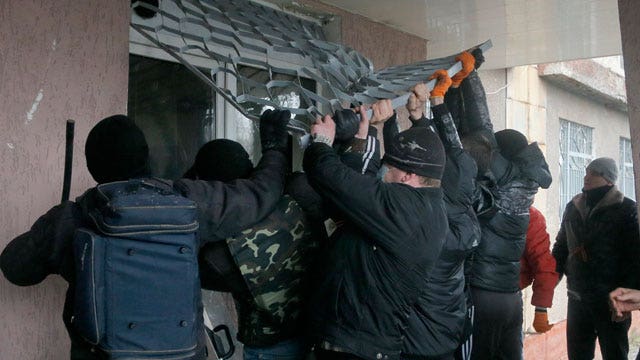Does the US need a tougher response to Russia?
Reaction to Sen. McCain seeking a more hawkish approach from the White House to help Ukraine
The continuation of Putin’s push into Ukraine makes it official. The Obama Doctrine is to ignore an international crisis or go to war. There is no in between. And President Obama’s been clear that he isn’t going to start any new wars.
The recent bipartisan push by Congress to help Ukraine, however, was the latest signal that the president's foreign policy is unraveling and his doctrine of ‘war or ignore’ is making America less safe.
The bill had a huge majority in Congress (378-84 in the House, 98-2 in the Senate) pushing back against a slow and disinterested White House.
[pullquote]
The bill's co-author, Tennessee Republican Senator Bob Corker said that the bill “allows Congress to speak with one voice in support of the Ukrainian people and against Russian aggression.”
What he didn’t say, but didn’t have to, was that U.S. allies are worried that Obama speaks with his own voice: one that absolves the U.S. of a response to Russian imperialism and aggression.
Allies throughout Eastern and Central Europe are justifiably worried about their futures because the once reliable U.S. is nowhere to be found as President Putin makes his moves. Allies are worried the new and weaker U.S. wouldn’t be there for them should Putin continue.
As a candidate Obama campaigned, throughout 2008, on the promise to end the wars in Iraq and Afghanistan. His commitment to end the current wars and not start any new wars was, in and of itself, a political statement, not a national security strategy.
For many Americans, Obama’s political promise was a welcomed pendulum swing back from the days where many believed President Bush’s cowboy diplomacy was too aggressive.
The Bush doctrine was the freedom doctrine. If democracy seekers anywhere around the world were looking for solidarity, then Bush believed America had a responsibility to help them.
His words were a political promise that a real red line had been drawn. If opponents crossed that line then our friends and enemies knew Bush would act.
But Obama’s promise of a red line is now viewed very differently. For example with Syria, Obama’s assurances of consequences for crossing his red line have a very different meaning. His threat is empty. And many U.S. enemies, and even some allies, like a U.S. president that walks loudly and carries no stick.
Obama, after all, is a professional community organizer and academic professor. He is used to organizing protests and giving speeches to audiences that are getting graded on listening to his every word. As an Illinois State and U.S. Senator, Obama briefly learned that political organizing could produce strong emotions, press releases and news stories.
But the president has very little experience with evaluating the success of his actions. Yes, a good speech can motivate people and Obama is clearly a very good speech giver. But in the real world of multilateral diplomacy, Obama’s class room strengths are not strengths at all.
The president forgets that every country acts according to its own needs and not the global goal of one world, one people. While other countries may espouse the liberal utopian dream of a global community, it’s usually only to get the richer countries to pay more money for the world’s problems.
The Obama doctrine of ignoring international issues and claiming it’s none of the U.S.’ business is a philosophy that has allowed Russia, Iran and China to step up and take the lead. And it has created uncertainty around the world.
In Poland, where Biden previously rushed to calm the uncertainties, 59% of the Polish people believe Russia is threatening their national security.
Poland, a close American ally, has doubts about America’s commitment to stopping Russian Imperialism.
In Saudi Arabia, there are concerns that the U.S. will allow Iran both to control Syria and to build a nuclear bomb.
Afraid of being abandoned, the Saudis have made the very dangerous move of trying to replace America’s friendship with Pakistan’s, recently giving the terrorist-haven a $1.5 billion “friendly gift.”
The Israeli Defense Minister recently conceded that the Jewish state can no longer rely on the U.S. to deal with Iran. He repeatedly used the word “weakness” to describe the perception of America not just in Israel and Iran but around the world.
In Japan, fears of a weak U.S. in the face of Chinese aggression are leading to the first Japanese military buildup since World War II.
In Germany, a country that does not take Hitler comparisons lightly, the Finance Minister said of Putin’s Crimea gambit, “Those are the methods that Hitler has applied in the Sudetenland” -- a warning not to Berlin, but to Washington.
The people of Venezuela understand the Poles’, Saudis’, Israelis’ and Japanese fears of not being able to count on the Obama administration. And so do the people of the Balkans and Georgia.
Obama’s "war or ignore" philosophy is causing real fears for the people around the world who are fighting for greater liberty, human rights and against aggression.
Congress looks worried. It needs to take matters into its own hands.

